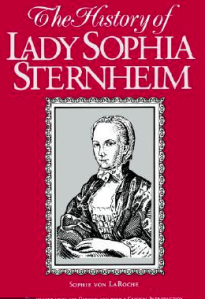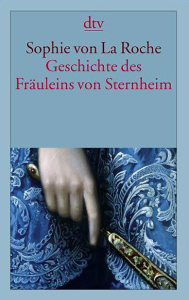

Published in 1771,The History of Lady Sophia Sternheimis considered the first German woman’s novel. Sophie von La Roche was born in Kaufbeuren in Germany in 1730 and died in Offenbach am Main in 1807. She was the grandmother of Bettina and Clemens Brentano and the cousin of the poet and writer Christoph Martin Wieland. She had eight children, one of which, her favourite, Maximiliane, the mother of Bettine and Clemens, died at the age of 37 after having given birth to twelve children. Sophie von La Roche was very well educated and one of the earliest known German women who traveled widely and independently. She was also the first financially independent German writer. Other than novels, she also published several of her travel diaries.
All this tells us that she was very much a woman of her time but also ahead it of it, which is obvious in The History of Lady Sophia Sternheim.
The History of Lady Sophia Sternheimis an epistolary novel and tells the story of a young woman who has lost both of her parents and is now in the care of a pastor and her greedy aunt countess Löbau.
At the beginning of the story, countess Löbau takes her niece to D. where she introduces her to the court.
Sophia who loves the countryside, hates life at court. She much prefers a more quiet, useful life. The way the courtiers kill time with shallow amusements and games, not allowing time for introspection and solitude, is painful to Sophia. Furthermore, Sophia who so likes to study and read, isn’t allowed to do so as her aunt doesn’t approve of it.
At court, Sophia immediately attracts the attention of the prince. Hoping for favours at the court, her uncle and aunt decide she should become the prince’s mistress. They do not inform Sophia of their plans and so it is rather painful to read how this gentle, intelligent woman is slowly, but steadily trapped.
A young diplomat, Lord Seymour, is also interested in Sophia and she seems to like him very much as well. Unfortunately, not knowing that she has no intention of becoming the prince’s mistress and isn’t even aware of what is going on, he distances himself from her.
Another young nobleman, the roguish Lord Darby, tries to seduce Sophia and finally manages to convince her to run off with him. She thinks he wants to help her escape the prince, but Darby’s intentions are anything but gallant.
I won’t reveal the rest of the book. Let’s just say – it’s very dramatic.
The way life at court is described, as well as the social conscience of the heroine who tries to help the poor whenever she can, was way ahead of its time. It surprised me a lot. The book openly criticises the selfishness and idleness of the upper classes. But it also wants to educate and show another, more noble way for rich and aristocratic people to treat the poor. The book is equally outspoken when it comes to the treatment of women at court. Sophia wants to be seen as a person, appreciated for her intelligence, not her looks. Even though nowadays, in our Western society, no woman is forced to marry and have one child after the other, a lot of what is described in this book, is still very recognizable. It was off-putting to read how the men treated Sophia, seeing her only as an object of lust and desire. They ogle her, undress her with their eyes, try to seduce and touch her, without any concern for her feelings and regardless of her consent. For any woman who knows these kinds of looks and unwanted advances, this could be a triggering book. While the prince is a lecher, Lord Darby sounds like a true pervert reminiscent of people like Jeffrey Epstein or Harvey Weinstein. Reading about the whole plotting and scheming against Sophia was upsetting. Lord Darby and his letters made me also think of Valmont in Choderlos de Laclos’ Dangerous Liaisons. Darby, like Valmont, enjoys the idea of seducing Sophia because she is so gentle, kind, naïve, and, above all, virtuous.
While Les liaisons dangereuses is one of my favorite books, I would lie if I said I enjoyed this. It was a bit like 2020 – painful and seemingly never-ending. I just didn’t care for the style. As it’s a typical example of a sentimental novel, a genre that was very fashionable at the time, it was overly emotional and mawkish. All this outpouring of feelings was insufferable to me. It was interesting to read it as an example of a genre, but not very enjoyable.
I know I won’t read any of her other novels but think I would enjoy to read a biography of Sophie La Roche. She must have been a fascinating woman and the ideas and thoughts that she expounds in the novel are interesting.
Has anyone else read this? How did you get along with it?
